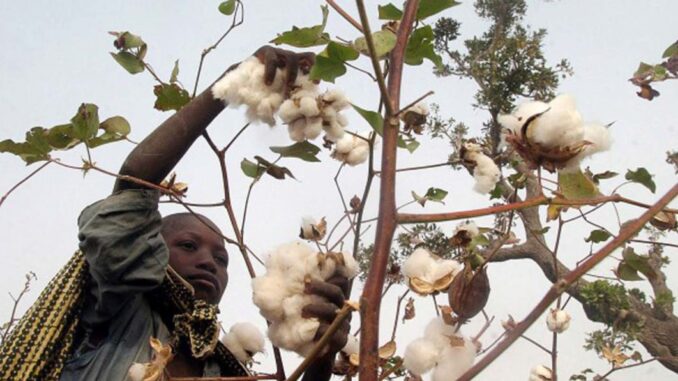
Ogun State Government has reiterated its commitment to reviving the state’s economy by empowering interested farmers, especially youths, through various commodities, including cotton production.
The Commissioner for Agriculture, Dr. Adeola Odedina, while reacting to The Guardian story published on Sunday, January 31, titled: ‘Concern Over Ogun Cotton ABP Stalemate,’ said the state, under Prince Dapo Abiodun-led administration, is set to revitalise the state’s economy through agriculture, via the implementation of the Anchor Borrowers’ Programme (ABP), an initiative of the Federal Government, monitored by the Central Bank of Nigeria (CBN).
He added that the state had approved the release and demarcation of 10,000 hectares of land at Iwoye-Ketu, in Imeko Afon Local Council Area, as a commitment to resuscitating and sustaining cotton production in the state, being the leading producer of long staple cotton variety in the country.
“So far, interested farmers have been registered under the scheme who have also begun cultivation of the land allotted to them,” Odedina said.
Chairman of the National Cotton Association of Nigeria (NACOTAN) in the state, Olorunshola Osasona, who confirmed the commissioner’s claim, said among all the states in the Southwest region, the process of the ABP was smoother in the state because of the existing interest and motivation the government has in boosting cotton production.
Osasona said: “Last year, three windows were opened to cotton farmers in the state; the Federal, State, and Prime Anchor. NACOTAN is a national body represented in no fewer than 33 states, including the Federal Capital Territory (FCT). The first window of the ABP was coordinated centrally through our head office in Kaduna with 47 beneficiaries in the state.
“Under the second window, a United Kingdom-based private investor, House of Dorcas Industrial Cotton (HDIC) sought to partner with the Southwest zone of the association with particular reference to Ogun, Oyo, Osun, Ondo and Ekiti states.”
He said the preparation began with the mobilisation of prospective farmers and land, while the company focused on the mobilisation of funds and processing of relevant documents needed for the take-off of the project.
“The government had envisioned a complete engagement of the entire cotton textile and garment value chain with the intent of employment generation, and textile industrialisation with special preference to boosting the Adire Indigenous Technology, which served as a competitive advantage for the state. Also, the Chief Executive Officer of HDIC is a proud daughter of the state, which we leveraged on to open up the opportunity to our people,” he said.
The NACOTAN chairman added that the state government was also mobilising farmers, especially women and youths, to key into the 2020 ABP.
He said along the line, a consensus was reached to collapse their prospective beneficiaries under the Prime Anchor of HDIC Cotton since the project was driving towards the same destination of creating opportunities for the people of the state.
“At this point, the state focused on completing the survey and documentation of the 10,000 hectares of land allocated for cotton production in Iwoye Ketu, so it could be ready for usage from the last season.
“There was great excitement and renewed hope in the cotton atmosphere in the state due to the different opportunities in view. However, it was at the height of this that the COVID-19 struck, and the lockdown caught up with the principal implementing officers of the company in the UK.
“We didn’t give up, though there was the lockdown, as we continued to push throughout the region with the hope that the production would become a reality. By the time COVID-19 declined, the protracted draught of last year had set in. And because cotton production is time-bound, and we were not prepared for irrigation, it was only logical to discontinue the process.”
Osasona said because the ABP is a chain of many events, and at that point, even the funds to pay input suppliers had not been approved, he added that it made no economic sense to take uncalculated risk, especially with the chain of unforeseen events of the nature that characterised the experience of most farmers last year, not just cotton. “This development was communicated on our telegram platform and also through the arrowheads of participating groups,” he added.
END

Be the first to comment